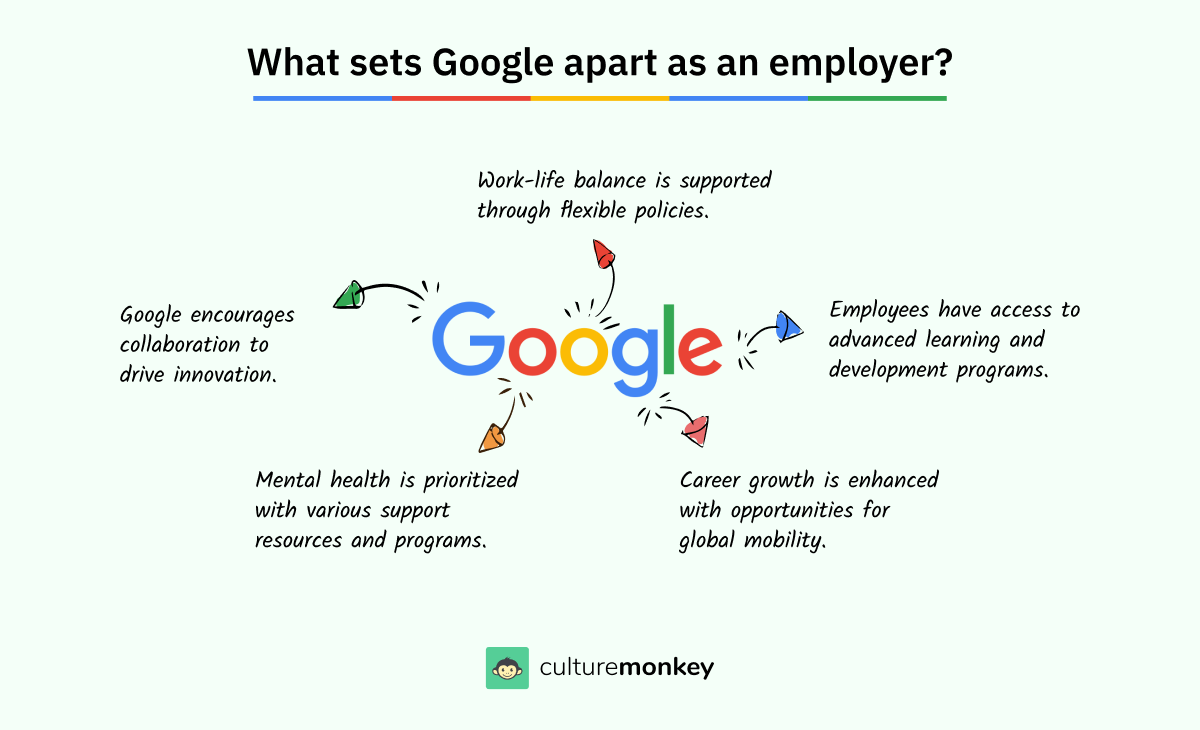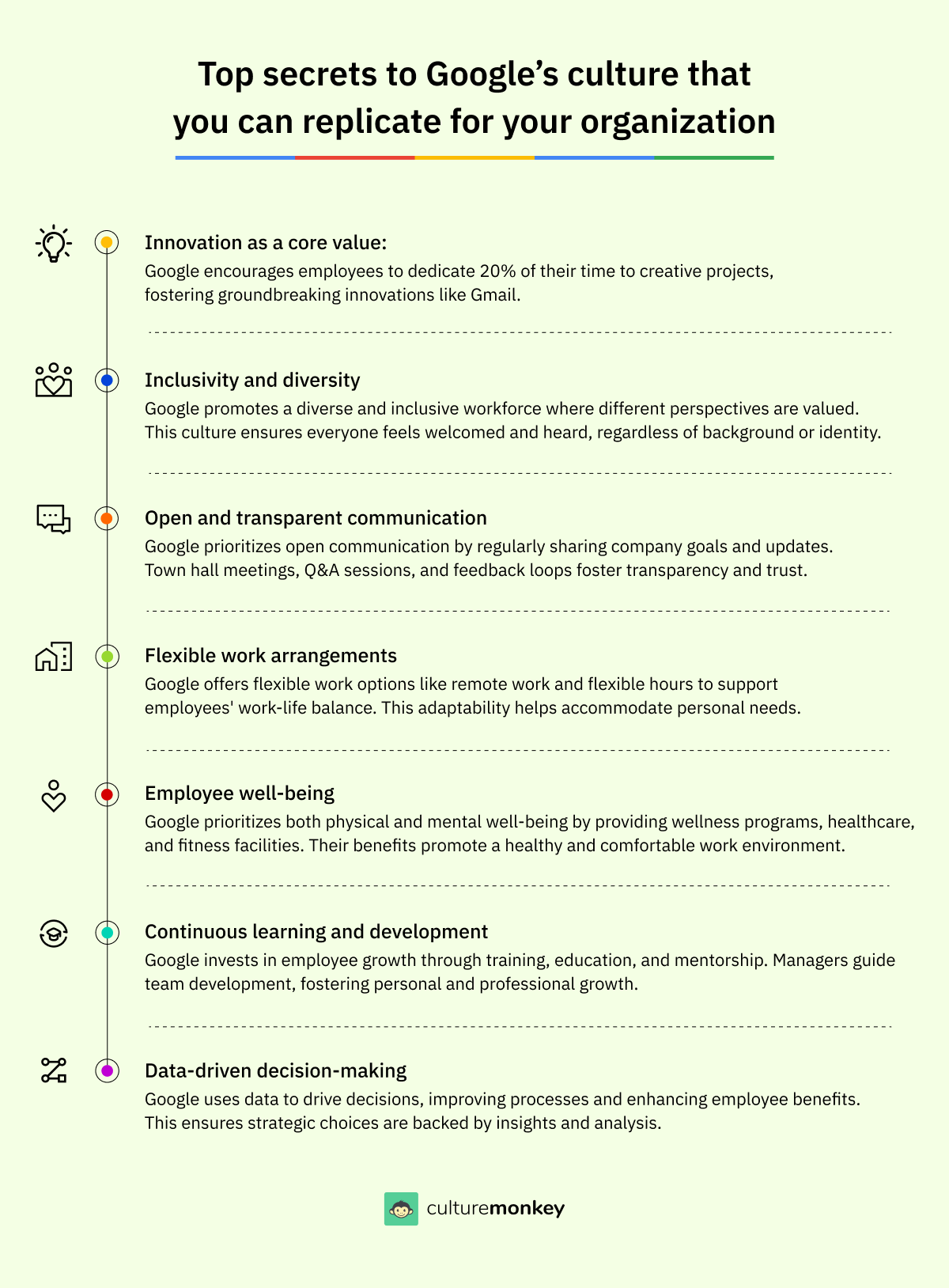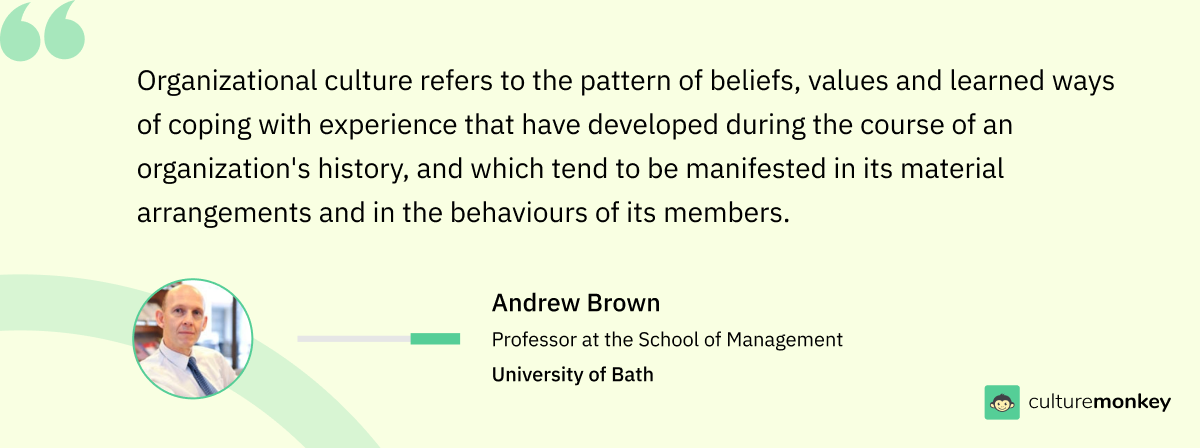Why is Google values and culture this amazing: 13 Secrets you should know about their culture and get inspired from

Imagine a workplace where taking a break to play ping pong or grab a gourmet lunch is just as normal as attending a meeting. A workplace where you’re encouraged to spend part of your day brainstorming your wildest ideas—no immediate deadlines, no pressure, just the freedom to innovate. Now, think of a place where employees ride scooters around the office or take naps in cozy pods
Welcome to Google. It’s a company that doesn’t just preach work-life balance—it lives it. Google’s approach to culture is a blueprint for any company looking to create a space where people are motivated, creative, and loyal.
So, how does Google create an environment where employees feel supported to think big and make bold moves? Let’s dive in.
Blog Highlights


Why Google has the best company culture?
Google's claim to having the best company culture isn't just a tagline; it's a result of a carefully cultivated environment that sets the bar for organizations worldwide. It isn't just about bean bags and free food; it's a result of their commitment to innovation, inclusivity, employee well-being, and transparent communication.
This unique blend of elements creates an environment where employees thrive and continue to push the boundaries of what's possible.
It's no wonder Google's workplace culture is a model for companies worldwide striving to improve their own corporate cultures.
What are Google's values and culture?

Google's core values and culture are the cornerstone of the company's identity and have played a pivotal role in shaping its success. They can be summed up in several key principles:
- Focus on the user: Google's primary goal is to create products and services that serve the best interests of its users. This focus on user experience is fundamental to its culture and drives product development and innovation.
- Innovation: Innovation is in Google's DNA. They encourage their employees to think creatively, take risks, and explore new ideas. The company's "moonshot thinking" philosophy pushes the boundaries of what's possible with computer software.
- Organizational transparency: Google work culture values transparency. They share information widely with employees and actively encourage open and honest communication. Regular town hall meetings and Q&A sessions with top executives foster a culture of transparency and trust.
- Inclusivity and diversity: Google is committed to creating an inclusive and diverse workforce. They strive to reflect the global diversity of their users and believe that a broad range of perspectives fuels creativity and innovation.
- Work-life balance: Google employees understand the importance of maintaining a healthy work-life balance. This is reflected in the numerous employee benefits, including flexible work hours, on-site amenities, and support for personal and family needs.
- Environmental responsibility: Google is deeply committed to sustainability and reducing its environmental impact. The company aims to operate using 100% renewable energy and has set ambitious sustainability goals.
- Don't be evil: While this motto has evolved to "Do the Right Thing," it's still a foundational principle. Google emphasizes ethical decision-making and strives to have a positive impact on the world. They aim to make the internet a safer and more accessible place.
- Continuous learning and growth: Google promotes a culture of continuous learning. They offer various training and educational opportunities for employees, and managers are encouraged to be mentors, supporting personal and professional growth.
- Feedback and accountability: Instead of relying on traditional annual performance reviews, Google encourages ongoing, real-time feedback and accountability. This helps employees understand their strengths and areas for improvement.
- Embrace failure: The company's management style acknowledges that failure is a part of innovation. They view failure as a learning opportunity and an essential step toward success.
- Cross-functional collaboration: Google company culture fosters a culture of collaboration across different teams and departments. They believe that diverse perspectives and expertise coming together can lead to more innovative solutions and better products for users.
- Community engagement: Google is actively involved in giving back to the communities where it operates. Through various philanthropic initiatives and volunteer programs, employees are encouraged to contribute their time and skills to make a positive impact locally and globally.
- Data-driven decision-making: Google relies heavily on data to make informed decisions. They emphasize the importance of collecting and analyzing data to understand user behavior, measure the impact of their products, and identify areas for improvement.
- Flexible work arrangements: Recognizing that different employees have different preferences and needs, Google offers a variety of flexible work arrangements. This includes options for remote work, part-time schedules, and job-sharing arrangements to accommodate diverse lifestyles.
- Personal development: Google encourages employees to take ownership of their career development. They provide resources and support for setting goals, acquiring new skills, and pursuing opportunities for advancement within the company.
- Passion for excellence: Google fosters a culture where employees are encouraged to strive for excellence in everything they do. This commitment to high standards ensures the delivery of innovative and reliable products, like Gmail and Google Maps.
- Empowering employees: Google empowers its workforce by promoting autonomy and encouraging employees to take ownership of their projects, fostering creativity and initiative across all levels.
- Focus on impact: The company emphasizes creating meaningful work that has a positive and lasting impact on users, communities, and the world at large. Employees are encouraged to align their efforts with this broader mission.
- Celebrating achievements: The core values of Google company are recognizing and celebrating both individual and team accomplishments. From awards programs to shout-outs in company-wide meetings, achievements are highlighted to boost morale and motivation.
The importance of culture in Google’s success
- Cross-department collaboration: Google places great emphasis on collaboration across teams and departments. This approach allows for a free flow of ideas and expertise, which leads to innovative solutions that might not emerge in isolated environments.
- Encouraging lifelong learning: Google corporate culture fosters a learning culture by offering continuous education programs, workshops, and professional development opportunities. This helps employees stay ahead of industry trends and enhances their skills, directly contributing to Google’s growth.
- Data-driven culture: While innovation is at the core, Google company values heavily relies on data to make informed decisions. From product development to employee feedback, data plays a critical role in shaping strategies, ensuring that decisions are both creative and calculated.
- Risk-taking environment: Google’s culture encourages risk-taking. Employees are not penalized for failure but are instead encouraged to experiment and take calculated risks, which fosters a more innovative environment.
- Focus on employee happiness: Google invests in creating a positive work environment, offering extensive benefits and perks. This focus on employee well-being translates into higher motivation and retention rates, contributing to the company’s overall success.
- Celebrating failures as learning opportunities: In Google’s culture, failure is not stigmatized but seen as an essential part of innovation. This mindset encourages employees to take calculated risks without fear, ultimately leading to greater creativity and groundbreaking solutions.
Google culture and benefits

Beyond its cutting-edge technology and innovative projects, Google is celebrated for its distinctive corporate culture and exceptional employee benefits. Let's take a closer look at how Google's culture translates into some amazing perks and advantages for its workforce:
- Diverse and inclusive environment: Google is committed to building a diverse and inclusive workplace. This culture of acceptance and belonging ensures that employees from all backgrounds can thrive.
- Incredible workspace: Google's offices are more than just places to work; they're creative hubs. You'll find colorful interiors, nap pods, and even indoor slides. These unique spaces are designed to stimulate creativity and make the workplace enjoyable.
- Gourmet dining: Hungry? Google's got you covered. Employees enjoy access to gourmet, free meals at the company cafeteria. Whether you're craving sushi or a classic burger, you'll find it here.
- Flexible work arrangements: Google values work-life balance and offers flexible work arrangements. Whether it's remote work options or flexible hours, they understand that life happens.
- Professional development: The company invests heavily in employee growth. From in-house workshops to tuition reimbursement, Google supports its employees' professional development and continuous learning.
- Health and wellness: Google's commitment to employee well-being is evident through its on-site physicians, fitness centers, medical services, and stress-reduction programs. They want employees to be physically and mentally healthy.

- Family-friendly policies: Google understands the importance of family and offers generous parental leave, childcare support, and even "Baby Bonding Bucks" to help new parents.
- Travel opportunities: Google's culture encourages exploration and learning. Employees can participate in the "Googlegeist" program, which allows them to visit different offices worldwide.
- Financial security: Competitive salaries, stock options, and 401(k) matching are some of the ways Google ensures its employees' financial security.
- Philanthropy and giving: Google is deeply committed to philanthropy and encourages employees to volunteer and contribute to social causes. They even match employee donations to charitable organizations.
- Transportation perks: Google provides transportation benefits, including shuttle services, electric vehicle charging stations, and commuter subsidies.
- Data-driven decision-making: Google's data-centric culture extends to employee benefits. They use data insights to continually enhance their offerings, ensuring they meet employee needs and preferences.
- Career progression: Google encourages internal promotions and supports employees in advancing their careers within the company.
- Sustainability initiatives: Google's commitment to sustainability extends to its workplaces, with eco-friendly designs and energy-efficient buildings.
- Mental health support: Google prioritizes mental well-being through comprehensive resources like counseling services, mental health apps, and mindfulness programs. Employees can access these tools to maintain a healthy work-life balance.
- Global learning resources: Google provides employees access to extensive online learning platforms and global networks, enabling continuous skill enhancement and cross-cultural collaboration.
- Community engagement events: Google culture and values foster a sense of community through regular team-building activities, cultural celebrations, and local outreach programs, creating a vibrant and connected workplace.
- Unique employee perks: From on-site haircuts and laundry services to pet-friendly offices, Google offers a unique company culture that saves time and enhances daily convenience for employees.
What are Google’s leadership principles?
- Focus on users first: Google leaders prioritize the user experience in all decisions, ensuring that products and services meet user needs and deliver exceptional value.
- Empower teams: Leaders at Google create an environment where employees are encouraged to take ownership of their work, fostering creativity, accountability, and autonomy.
- Data-driven decision-making: Google workplace culture emphasizes the use of data and analytics to guide decisions. Leaders rely on evidence and measurable outcomes to validate strategies and improve processes.
- Encourage innovation: Leaders support a culture of experimentation, embracing failure as a stepping stone to success. They inspire teams to think big and challenge conventional approaches.
- Commit to diversity and inclusion: Google’s leadership is dedicated to building diverse teams and fostering inclusivity, ensuring that every voice is heard and valued.
- Lead by example: Google leaders model the values and behaviors they expect from their teams, promoting integrity, collaboration, and a commitment to excellence.
- Adapt and evolve: Google leaders remain flexible and responsive to changes, constantly refining their strategies to address emerging challenges and opportunities.
What is Google's slogan?
Google's slogan has evolved over the years to reflect its mission, values, and growth. Here’s a timeline of its slogans:
1. "Don't be evil" (2000 – 2015)
- Introduced in Google's corporate code of conduct, this iconic slogan emphasized the company's commitment to ethical behavior and doing the right thing. It symbolized Google's intent to avoid misuse of power and ensure transparency.
2. "Do the right thing" (2015 – Present)
- Replacing "Don't be evil" in 2015, this updated slogan retained the essence of ethical responsibility while framing it in a more positive, proactive way. It reflects mission of Google company to make decisions that positively impact users and society.
3. "Organize the world's information and make it universally accessible and useful" (1998 – Present)
- Although not a traditional slogan, this Google purpose statement statement encapsulates it's overarching goal and is often cited as its guiding principle.
4. "Search on" (2020 – Present)
- This more recent tagline focuses on inspiring users to keep exploring, discovering, and learning through Google’s search platform, reflecting its central role in connecting people to information.
How Google maintains its culture across global offices
Despite geographical differences, Google ensures that its core values and principles are reflected in every office. Here are key ways Google maintains its culture globally:
- Unified onboarding process: Google’s onboarding process is consistent across all offices, ensuring that every new employee, regardless of location, receives the same introduction to the company’s culture, values, and expectations. This helps instill a sense of belonging and alignment with Google’s mission from day one.
- Global leadership communication: Leadership at Google regularly communicates with teams around the world through virtual town halls and meetings. This helps keep all employees connected to the company’s goals and fosters a unified sense of purpose, regardless of physical location.
- Cultural ambassadors: Each Google office has cultural ambassadors, employees who help promote and preserve Google’s values at a local level. These ambassadors ensure that the Goolge principles, like innovation and inclusivity, are integrated into the daily operations of each office while respecting local customs.
- Local adaptation with core values: While each office reflects the local culture and customs, Google ensures that its core values—such as openness, creativity, and diversity—are consistently upheld. This balance of local adaptation and global alignment helps maintain Google’s unique culture worldwide.
- Employee exchange programs: Google offers programs where employees from one office can work in another office temporarily. These exchanges promote cross-cultural understanding, help disseminate Google’s culture across regions, and encourage knowledge sharing between offices.
How does the corporate structure of Google and its companies work?
- Parent company Alphabet Inc.: In 2015, Google restructured under the holding company Alphabet Inc. This move allowed Google to focus on its core businesses, such as search, ads, and YouTube, while Alphabet oversees other ventures like Waymo, DeepMind, and Verily. This structure provides better management of diverse projects and aligns each business with its strategic goals.
- Flat organizational structure: Google employee culture operates with a relatively flat structure compared to traditional corporations. While it has clear hierarchies, the company promotes open communication and collaboration across all levels. This encourages innovation, as employees feel empowered to share ideas directly with leaders.
- Functional divisions: Google organizes its operations into distinct functional areas, such as engineering, marketing, product management, and sales. Each division is headed by experienced leaders, ensuring specialized focus and efficient execution of company goals.
- Cross-functional collaboration: Collaboration across teams is a hallmark vision of Google’s structure. Employees from various departments work together on projects, leveraging diverse expertise to create innovative solutions. This approach also fosters a culture of inclusivity and shared accountability.
- Autonomous subsidiaries: Alphabet’s subsidiaries, including Google, operate with significant autonomy. Each company has its leadership team and budget, enabling them to focus on their niche areas. However, they still align with Alphabet’s broader mission of "organizing the world’s information" and tackling big global challenges.
13 Secrets to Google’s culture that even you can replicate for your organization

Google has an inclusive company culture that not only transformed the internet but also redefined corporate culture. Employees enjoy perks like gourmet meals, bean bag workspaces, and the occasional Nerf gun battle. But beyond the fun, Google's culture is a model of innovation, inclusivity, and employee engagement.
It’s not a mystery, though—Google’s culture is built on principles that any organization can adapt to create an engaging and dynamic workplace. Here are 13 secrets from Google’s culture that you can implement in your own company.
- Innovation as a core value: Google thrives on innovation. The company's founders, Larry Page and Sergey Brin, established a policy known as “20% time” policy encourages employees to dedicate a portion of their week to side projects, leading to breakthrough ideas like Gmail. Make room for creativity in your organization by giving employees the freedom to experiment and innovate.
- Inclusivity and diversity: Google’s success is driven by a culture that values different perspectives. Building a diverse team where everyone feels heard and respected creates an environment that fosters innovation. Prioritize inclusivity and celebrate unique viewpoints in your organization.
- Open and transparent communication: Google’s transparent communication helps employees stay aligned with company goals. Regular town halls and Q&A sessions ensure that everyone is informed and involved. Encourage openness in your organization by keeping communication clear and accessible.
- Flexible work arrangements: Google recognizes the importance of work-life balance by offering flexibility in how and where employees work. Whether it’s remote work or flexible hours, giving employees control over their schedules leads to better productivity and satisfaction.
- Employee well-being: Google’s wellness programs go beyond the basics, offering fitness centers and mental health support. Prioritizing employee well-being not only boosts morale but also leads to a healthier, more engaged workforce.
- Continuous learning and development: At Google, growth never stops. By offering learning opportunities and mentorship, they ensure employees are constantly developing. Invest in your team’s growth by providing training and mentorship to nurture both personal and professional development.
- Data-driven decision-making: Google relies on data to inform every decision, from product development to employee benefits. Using data-driven insights can help your organization make smarter, more effective choices that are backed by evidence.
- Positive impact on the world: Google’s mission to make a positive impact is a key part of its culture. When employees understand how their work contributes to a bigger purpose, it drives motivation. Inspire your team by aligning your organization’s goals with a mission that makes a difference.
- Embrace failure as a learning opportunity: At Google, failure is seen as part of the innovation process. They encourage employees to take risks and learn from mistakes. Create a culture where failure isn’t feared but embraced as a critical step toward success.
- Unique perks and benefits: While you may not be able to match Google’s perks, you can still offer creative benefits that fit your company. Tailored perks like flexible vacations or paid volunteer days can show employees that their well-being matters.
- Embrace autonomy and empowerment: Google empowers employees to take ownership of their work. By providing clear goals and trusting employees to execute tasks their way, you can foster a sense of autonomy that leads to greater engagement and innovation.
- Foster a sense of belonging: Google excels at creating a culture of belonging where employees feel connected and valued. Team-building activities and inclusive events can foster camaraderie and ensure that everyone feels part of the bigger picture.
- Encourage creativity in problem-solving: Google's culture thrives on creative problem-solving. They foster environments where brainstorming and bold ideas are welcome. Encourage your employees to think outside the box and explore unconventional solutions to everyday challenges.

5 Googles culture initiatives you should know and practices in 2025
Here are five cultural initiatives and practices that you should know about Google in 2025:
1) Hybrid work model
Google has embraced the hybrid work model, allowing employees to combine remote and on-site work. This initiative reflects the growing trend of flexibility in work arrangements among tech companies, catering to employees' preferences while maintaining a strong company culture.
2) Focus on mental health
In 2023, Google has continued its commitment to employee well-being by prioritizing mental health support. They've implemented a range of programs and resources to help employees manage stress, foster resilience, and maintain a healthy work-life balance.
3) Sustainability efforts
Google has intensified its sustainability initiatives by striving to achieve even higher environmental standards. They've set ambitious goals to reduce their carbon footprint, promote eco-friendly practices in the workplace, and inspire employees to adopt sustainable behaviors in their daily lives.
4) Distributed teams and global collaboration
With a global workforce, Google has fine-tuned its practices for effective collaboration among distributed teams. They've leveraged technology, cloud computing, and communication tools to ensure seamless global collaboration, fostering a culture where distance is not a barrier to productivity and innovation.
5) Data privacy and security training
Given the increasing importance of data privacy and security, Google has launched comprehensive training programs to educate employees on these critical matters. This initiative ensures that every employee is well-informed and vigilant about protecting user data and the company's reputation.
Diversity and inclusion at Google

Here are six key ways Google promotes diversity and inclusion:
- Diverse hiring initiatives: Google actively recruits from diverse backgrounds through outreach programs and partnerships to ensure a wide range of perspectives within its workforce.
- Inclusive leadership training: Managers receive training on inclusive practices, helping them create environments where all employees feel respected and supported.
- Employee Resource Groups (ERGs): Google supports ERGs like Women@Google and Black Googlers Network, which provide safe spaces for underrepresented groups and foster community.
- Inclusive product design: Google incorporates inclusivity into its products, ensuring tools are accessible to users of different cultures, languages, and abilities.
- Data transparency: Google releases annual diversity reports, showcasing its workforce diversity and holding itself accountable for improvement.
- Support for career growth: Google offers mentorship and sponsorship programs to help underrepresented employees advance their careers, ensuring equal opportunities for growth.
Why is Google having work culture problems today
- Growing bureaucracy: As Google working conditions has expanded, layers of management and bureaucracy have increased, slowing decision-making and stifling the innovative and agile culture the company was once known for. (Source: CNN)
- Employee activism conflicts: Rising instances of employee protests on issues like ethical AI development, workplace harassment, and controversial projects have highlighted internal tensions and eroded trust between employees and leadership. (Source: AI Business)
- Diversity and inclusion challenges: Despite efforts, Google work environment continues to face criticism over its handling of diversity, with some employees feeling that progress in creating an equitable workplace has been inconsistent. (Source: Forbes)
- Remote work friction: The shift to hybrid or in-office policies post-pandemic has sparked dissatisfaction among employees who value flexibility, leading to debates about work-life balance at Google and productivity expectations. (Source: HRD America)
The role of leadership in shaping Google’s culture
The company’s leaders have prioritized a culture of innovation, openness, and inclusivity that defines Google today. Here are five key ways leadership has influenced Google’s culture:
- Visionary leadership from the start: Google’s founders, Larry Page and Sergey Brin, set the tone early by embedding a culture of curiosity and risk-taking. Their commitment to innovation and forward-thinking decision-making created a foundation for a company that continually pushes boundaries, a trait that continues to influence its culture.
- Leading by example: Google’s leadership emphasizes leading by example, where senior executives are accessible and actively participate in brainstorming sessions and collaborative projects. This has fostered a culture where employees feel empowered to share ideas, knowing that leadership is engaged and supportive.
- Encouraging transparency: Google’s leadership is committed to open communication, and hosting regular town hall meetings and Q&A sessions. This transparency has built trust between employees and management, encouraging openness and fostering a collaborative environment where everyone feels valued.

20 Must-Ask Questions to Strengthen Your Company Culture
These questions are designed to help leaders gain deeper insights into employee satisfaction and overall environment.
- Prioritizing employee development: Leaders at Google place a strong emphasis on learning and development. By promoting mentorship programs and creating opportunities for employees to grow within the company, leadership ensures that Google’s workforce remains motivated and forward-thinking.
- Promoting ethical leadership: Google’s leadership promotes ethical decision-making, embedding values such as integrity and fairness into the company’s operations. This has set a standard for ethical behavior, helping to shape a positive culture with Google's core values.
Is Google’s culture the right culture for any organization?

Google’s culture is undeniably impressive, but it may not be a one-size-fits-all solution for every organization. Built on principles of innovation, inclusivity, and employee well-being, Google’s approach works exceptionally well for tech-driven companies that thrive on creativity and need to attract top-tier talent.
The freedom to experiment, unique perks, and emphasis on autonomy make it ideal for environments where pushing boundaries is a key driver of the advertising business' success. However, for smaller businesses or industries like manufacturing, replicating Google’s scale and perks might not be feasible. Not every company can offer gourmet meals or 20% time for personal projects.

It’s important to remember that while elements of Google’s culture can serve as inspiration, every organization needs a unique company culture, tailored to its specific values, goals, and industry demands.
For example, what works for Google in the fast-paced tech world may not align with the operational needs of a manufacturing plant, where different types of structure and management styles are necessary.
The key is to take the lessons from Google—like fostering innovation and valuing inclusivity—and adapt them to create a culture that resonates with your workforce and business goals. Every organization should define its culture based on what truly drives its success.
Conclusion
Google's culture sets a high standard for innovation, inclusivity, and employee well-being, but it’s not a universal fit for every company. While its principles can offer inspiration, organizations like must create a culture that aligns with their specific goals and workforce.
For tech-driven companies or those focused on employee engagement, employee feedback is essential to improving company culture.
Gathering regular feedback allows organizations to understand what drives engagement, identify areas for improvement, and foster an environment where employees feel valued and heard. By actively listening and acting on feedback, companies can create a culture that supports innovation, collaboration, and overall satisfaction.
With CultureMonkey’s advanced survey tools, you can create a workplace that’s aligned with your vision and values, leading to long-term success.
Ready to build a culture where your employees thrive? Let CultureMonkey help create a workplace that’s aligned with your vision and values.
Summary
Google’s culture is renowned for its focus on innovation, inclusivity, and employee well-being, making it a global model for corporate culture. Key principles include transparency, diversity, work-life balance, and continuous learning, with perks such as flexible work arrangements, gourmet meals, and wellness programs.
Google fosters creativity by encouraging employees to take risks and embrace failure as a learning opportunity. Its data-driven decision-making, sustainability initiatives, and focus on personal development further enhance its dynamic work environment.
FAQs
1. Does Google's culture impact employee retention?
Absolutely, Google's culture plays a significant role in employee retention. The innovative, inclusive, and employee-centric work environment not only attracts top talent but also keeps them engaged and satisfied. The unique perks, commitment to personal and professional growth, and a sense of purpose contribute to long-term commitment from employees, making Google's company culture an example of how a positive work culture can enhance retention rates.
2. How does Google maintain a work-life balance in its culture?
Google maintains a work-life balance by offering flexible work arrangements, with flexible working hours such as remote work and flexible hours. On-site amenities, including fitness centers and healthcare services, support employee well-being. Regular communication on setting boundaries and time management workshops help employees manage their professional and personal lives effectively, ensuring that they can thrive both at work and at home.
3. Are Google's culture and benefits scalable for small businesses?
While some elements of Google's culture, like a focus on innovation and inclusivity, can be adapted for small businesses, replicating all the perks may not be feasible due to budget constraints. Smaller organizations can prioritize creating a supportive, creative, and inclusive work environment that aligns with their resources and goals.
4. How does Google measure the success of its sustainability initiatives?
Google measures the success of its sustainability initiatives through key performance metrics. This includes tracking energy consumption, carbon emissions, and waste reduction. They set specific targets related to sustainability and environmental impact, with regular reports and assessments to ensure they are on track to meet their ambitious sustainability goals.
5. How does Google's culture adapt to remote or hybrid work environments?
Google's culture adapts to remote and hybrid work by emphasizing flexibility, collaboration, and communication. Through tools like Google Meet and Workspace, teams stay connected across locations seamlessly and effectively. Leadership promotes autonomy while maintaining a strong focus on inclusivity, transparency, and employee well-being, ensuring that the same innovative and supportive culture thrives, regardless of where employees work, globally.



